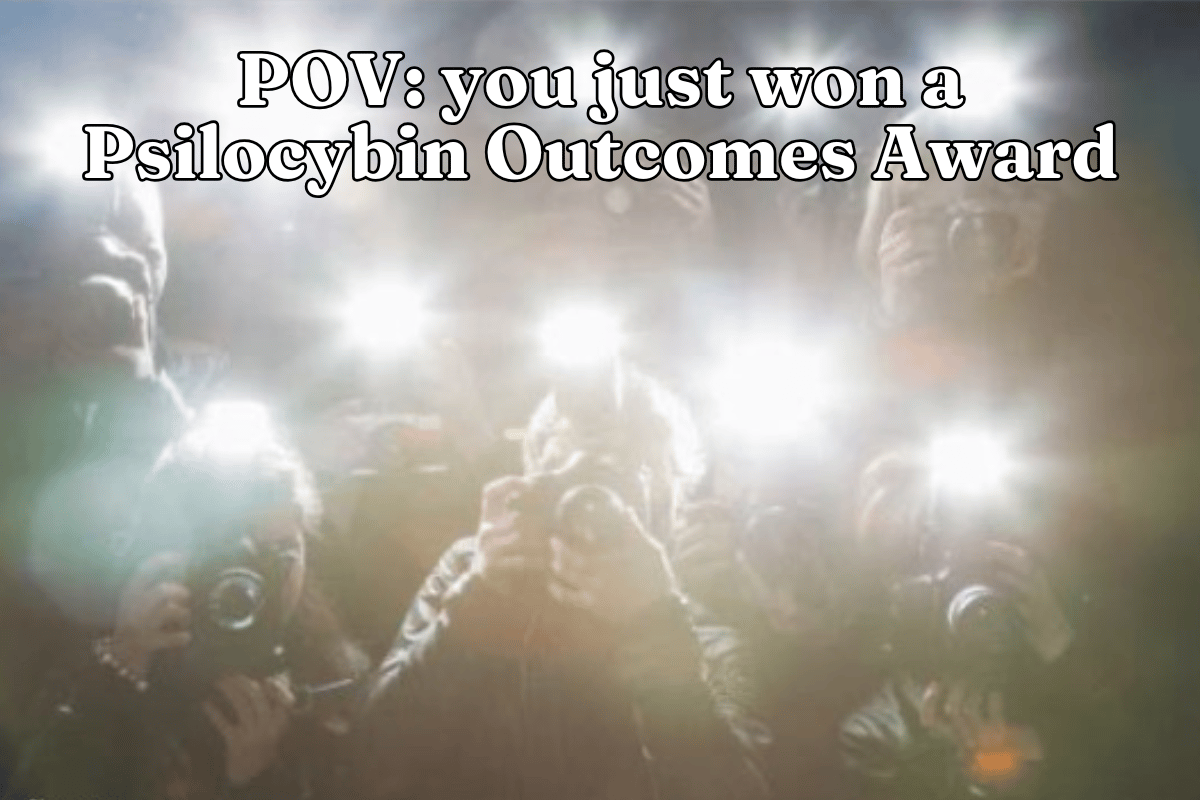Welcome to Tricycle Day. We’re the psychedelics newsletter that checks all the boxes: comprehensive ✔, accessible ✔️, fun ✔️, read by wonderful humans ✔️, orders you DoorDash ❌. Welp, 4 out of 5 ain’t bad.
Here’s what we got this week.
Clinical trials have a set-and-setting problem 🛋️
The first Psilocybin Outcomes Awards 🏆
Mindbloom sues the Wall Street Journal 🧑⚖️
What’s playing in the PORTAL dome 🌐
FROM OUR SPONSORS
For centuries, South African communities have used Kanna daily for stress relief and wellbeing.
Now you can hear directly from indigenous stewards and healers about this heart-opening plant medicine in KA!'s fascinating 4-min documentary.
When you’re ready to try it yourself, their 30-Day Journey pairs daily Kanna with guided practices so you can step into a truer you.
86% of users report improvements in mood, empathy, and focus.
(Psst, practitioners. With results like that, you may want to add KA! to your client toolkit.)

MICRODOSES
🔬 Research
Your brain on drugs: A review of 81 neuroimaging studies shows how psilocybin changes brain activity and alters sensory and emotional processing.
Feeding the soul: Psilocybin can treat anorexia nervosa by surfacing dissociated traumatic memories.
Keep your options open: Over 60% of psychiatric patients surveyed were open to both hallucinogen and non-hallucinogenic forms of psilocybin therapy.
Expect the unexpected: When both treatments were unblinded (and subject to expectancy effects), psychedelics actually didn’t outperform SSRIs. Both worked.
Please please me: University of Colorado is actively recruiting for a clinical trial of psilocybin for anhedonia (the absence of pleasure or joy) in depression.
🏛️ Policy
Drug trade: New Hampshire lawmakers attached psilocybin defelonization to a fentanyl mandatory minimum bill.
No take-backs: After it had cleared the House and Senate once already, Maine lawmakers killed a bill that would have decriminalized psilocybin.
What Elsa you got: The FDA is rolling out its own AI tool to expedite clinical reviews of new drug applications.
After much cajoling: Health Canada granted its second ever legal authorization for psilocybin treatment for cluster headaches through its Special Access Program.
Opinion: Psychedelic access begins in your backyard.
📈 Business
Wall Street bets: Analysts believe MindMed’s stock price could rally 237.5%.
Mind over gray matter: Ambio Life Sciences launched the world’s first clinical ibogaine program for neurodegenerative conditions.
Not bad, statistically: In Oregon, 9 of the 34 total psilocybin service centers that opened over the past two years have closed.
Heavy deuty: Cybin secured another patent for its deuterated DMT program.
Legally speaking: An attorney advises healthcare providers on how to speak to patients about psychedelics.
🫠 Just for fun
Did you hear that? Psychics could transform how we treat auditory hallucinations.
It’s over for ice baths: Darkness retreats are the newest spiritual conquest for tech elites.
Life in plastic, not fantastic: The founder of the Tushy bidet is back with diaper-eating mushrooms.
The people need to know: Can you legally trade cannabis for mushrooms in Colorado?
Meme of the week: When you point out that mushrooms are safer than alcohol…
THE PEAK EXPERIENCE

Checklist manifesto
Quick, name the last time you had a mystical experience in a sterile lab while scientists watched and took notes.
Yeah. Thought so.
We all know context matters. Even scientists love to talk about “set and setting” (the idea that a person’s mindset and environment shape their psychedelic experiences). But the dirty secret is, research so far has done a pretty bad job taking it into account.
Now a team of researchers is trying to change that. This week, they published the first global guidelines for reporting "set and setting" variables in psychedelic clinical trials.
After surveying 89 experts from 17 countries, they’ve created the ReSPCT guidelines. Here’s what made the cut for their 30-item checklist.
🛋️ Physical environment: Factors like room ambiance, access to nature, and whether participants can use the bathroom privately (it’s the simple things)
💊 Session procedure: Who's in the room, what music is playing, how much control participants have over their environment
🫂 Therapeutic approach: What kind of preparation and integration support is provided, qualifications of staff, cultural competence
✨ Subjective experience: Therapeutic alliance and trust, physical comfort, sense of safety
It might seem obvious that this kind of stuff should be paid attention to. But embracing these non-drug factors sorta flips traditional clinical research on its head. Instead of trying to control or eliminate environmental variables, these guidelines acknowledge that context is an intervention.
It’s not navel gazing, either. Minimizing the impact of set and setting in psychedelic research has already had harsh consequences. The FDA rejected MDMA therapy last year partly due to inconsistent reporting across the trials.
So maybe this level of rigor is what’s needed to get psychedelic medicines approved. Next time, we better see full documentation of the ceiling’s glow-in-the-dark stars. 🫠
AFTERGLOW

We’d like to thank the Academy
Roll out the red carpet. We’ve got some psilocybin A-listers coming through. Althea, a software company that helps psilocybin facilitators and service centers manage clients and stay in compliance, just announced the inaugural 2025 Psilocybin Outcomes Awards. It’s basically the Oscars for psychedelic therapy, but instead of a bunch of crotchety elites picking the stars, it’s cold hard data.
Althea used real participant data from validated assessment tools to crown winners in categories like "Excellence in Depression Relief," “Anxiety Alleviation Leader,” and the evocatively named "Mystical Catalyst Award.” Since Althea processes roughly half of all sessions under Oregon Psilocybin Services, they've got solid visibility into who's actually delivering results versus who's just talking a good game (or is too modest to speak up).
This is a pretty big deal for an industry that's spent decades operating in the shadows. Having objective, measurable outcomes gives legitimacy to what many have seen or experienced anecdotally—namely, that this stuff works when done right. As Oregon's program matures and Colorado comes online, data-driven accountability could separate the wheat from the chaff. So, do the winners get a golden mushroom trophy, or is that too on the nose?
[Insert headline that won’t get us sued]
Oh no, Mom and Dad are fighting again. Ketamine telehealth company Mindbloom is suing The Wall Street Journal for $39.35 million, claiming a 2024 article falsely linked the company to Matthew Perry's death. The headline of said article? "People are injecting ketamine at home: Matthew Perry overdosed on anesthetic that Mindbloom is sending by mail." Yeah, not exactly the earned media most brands would be stoked about.
Mindbloom argues the article created a "false and devastating connection" between the company and Perry's overdose. After all, he was never their customer. So CEO Dylan Beynon went full conspiracy mode on LinkedIn, accusing WSJ of lying and suggesting the coverage is part of a broader hit job on generic ketamine therapy, ever since J&J launched its competing drug Spravato in 2019. Mindbloom claims damages of $4 million in lost profits and $35 million in enterprise value.
Predictably, the journal is standing by their reporting. Whether Mindbloom can prove malice (the legal standard for libel) remains to be seen, but they're clearly betting a jury will buy their David-versus-Goliath(s) story against Big Media and Big Pharma. For the record, Tricycle Day is still lowercase little media, okay?
CYCLISTS’ PICKS
🎟️ Giveaway: PORTAL is giving away a pair of passes to their Meow Wolf takeover and a show of the winner’s choice at their 360° Dome in Denver. Reply to this email with the word “DOME” for a chance to win.
🏰 Magical refuge: When you’re ready for a change of scenery at PS2025, Psychedelic Playhouse is hosting back-to-back nights of education, community, art, music, and provisions. Take 10% off tickets with code TRICYCLE10.
🎥 Crowdfunding campaign: An Australian filmmaker (and fellow Cyclist) is raising money to create a documentary on psychedelics’ potential for improving wellbeing proactively, not just for treating illness.
🎙️ Live podcast: Mycologist Paul Stamets and Grammy-winning artist Kacey Musgraves are recording a live podcast in Nashville about the magic of mushrooms.
UNTIL NEXT TIME
That’s all for today, Cyclists! Whenever you’re ready, here’s how we can help.
📣 Promote your brand to 73k psychedelic enthusiasts.
Sponsor Tricycle Day.
🔍 Find a professional who can support your growth and healing.
Browse Maria’s List.
🫂 Step into community with fellow facilitators.
Learn about Practice Expansion.
📈 Scale your business with our marketing agency.
Apply to work with Let Go Studio.
😎 Style yourself out in our iconic merch.
Collect a shirt.
✍️ Need something else?
Drop us a line.
ONE CYCLIST’S REVIEW

So, how was your tricycle ride?
Forwarded this email? Subscribe here.
DISCLAIMER: This newsletter is for educational and informational purposes only and is not intended as a substitute for professional medical advice. The use, possession, and distribution of psychedelic drugs are illegal in most countries and may result in criminal prosecution.



